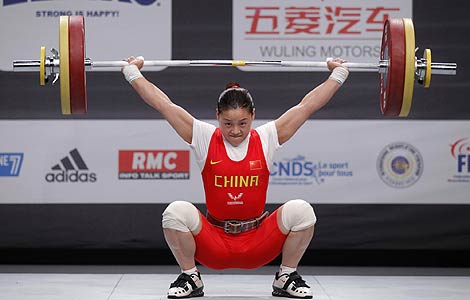Finding the right fit
Updated: 2011-11-11 09:05
By Yan Yiqi (China Daily)
|
|||||||||
"They have designs for East European consumers and even exclusive packing," says Wergeland, adding that apart from her three weeks' purchasing in Yiwu, she also needs to restock supplies twice a year.
"For people in my country, Yiwu is more than a famous place for purchasing small commodities. The low price, the large variety and good quality of socks are worth the plane ticket costs for me every year," says Wergeland.
"Yiwu's leading position in the sock industry should be largely attributed to the market platform in the city. For any industry, the market is always of prime importance," Jin says.
However, sock companies are not satisfied with just the market in Yiwu, and are searching for more channels to sell their socks to consumers from more countries. "We are now planning to spend 800,000 yuan to establish a multi-lingual online platform to sell socks," Jin says.
According to Jin, the association has invited all leading sock companies in Yiwu to join this campaign and hopes to invite the best e-commerce experts to operate this platform.
"We will not be dependent on Taobao.com (China's largest e-commerce platform), because we are targeting consumers all over the world, and not just in China," Jin says. The platform is under construction and is expected to be online by the end of next year.
Apart from online sales channels, Yiwu socks may soon find an outlet at the International Small Commodities Mart in Moscow. In June, the Zhejiang Bureau of Commerce approved Yiwu's project to build an international small commodities market in Moscow with an area of more than 80,000 sq m spread over 1,500 stalls.
"Russia, together with other Eastern European countries, have been our largest consumers. With the opening of the market in Moscow, more consumers will get to know about Chinese socks brands," Jin says.
According to China National Textile and Apparel Council, the leading four sock brands from China are all from Yiwu, with Langsha Holdings Group the leading player with a 17 percent market share in China.
Bonas Group, which started off as an OEM manufacturer, has gradually developed its own brands, and now focuses largely on the domestic market, which accounts for over 50 percent of its revenue.
"OEM and export are easier to manage, and the large quantity and the quick rebound of cash are still attracting many companies. But from a long-term perspective, establishing self-run brands, and taking a stable domestic market share will give us the initiative in the industry," Hong says.
Bonas socks can be found in almost all large supermarkets in China, covering more than 5,000 retail terminals. The company also owns more than 50 franchise stores in China, and the figure is expected to reach 200 next year, according to Hong.
Just like Bonas, an increasing number of socks companies in Yiwu have managed to create their own brands.
"Although Yiwu produces the most and best socks in the world, our socks can only be sold for 2 to 3 yuan in the international markets. But the prices of socks from a well-known brand can reach 15 euros as they have the added-value of a brand," says Jia Guinan, director of Yiwu Economic Development Bureau. He says that it is essential for the Yiwu sock companies to build up their own brands so that the added value is not taken away completely by foreign companies.
In 2010, the total sales revenue of the socks industry in Yiwu reached 10.8 billion yuan, which accounted for 40 percent of China's sock industry as a whole. More than $688 million of that came from exports, according to Yiwu Socks Industry Association.
Among more than 1,000 sock companies in Yiwu, 52 realized 200 million yuan of sales revenue in 2010, and totaled 6.7 billion yuan of revenue for the whole industry in Yiwu. These companies have mainly created their own brands.
According to Jin Shanfu, secretary-general of Yiwu Socks Industry Association, almost all sock companies in Yiwu started their business from OEM. "Companies chose that route because it was the easiest and safest way to get orders from foreign clients, and there was no need to worry about anything related to design or marketing.
"But it also meant that companies did not have any say in the international sock market, and even after decades of development our companies were still at the end of the industrial chain," he says.
For many business owners, the major challenge for transformation was the limited land and resources in Yiwu.
"Land is a big problem, because as far as I know, some companies with annual sales revenue of over 100 million yuan even have to rent a piece of land to operate factories. The government is not as supportive as it is to some other industries," Jin says.
Some leading companies have already moved their factories out of Yiwu to Anhui, Jiangsu and Jiangxi provinces.











